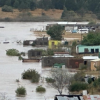- home Home
- keyboard_arrow_right CURRENT AFFAIRS
- keyboard_arrow_right Posts
- keyboard_arrow_rightThis Workers’ Month demands a way forward
This Workers’ Month demands a way forward
By Nomali Cele
This workers’ month has rolled around to find the South African labour landscape at a very important place. This workers’ month, more than any other time since, perhaps, 1994, is a deciding factor for the kind of country we want to have. Current events around labour ask a few questions of us: Do we want to be a nation that pays people well for all types of work? Do we want to pull our most vulnerable workers out of poverty?
This week, the national bus drivers’ strike is in its third week. Every bus commuter has had no choice but to use taxis, which has meant even longer queues and a longer wait time – with route laws and vehicle availability, taxis are a finite mode of transport. Taxis are also a more expensive transport option more most people – currently, people can pay R650 in a monthly bus ticket for a monthly work commute that would end up costing around R950 in taxis. This is not mentioning the money people have lost in monthly or weekly bus tickets that were rendered useless by the strike.
There’s nothing that shows the glaring disregard with which employers in this country treat their employees than a transport strike – no matter how dangerous roads and taxi ranks are, we have people running around straight into the danger just to punch in on time. The queues of thousands of low-income workers waiting longer for a chance to make it to work on time daily.
None of this is a judgement against the bus drivers currently on strike, it just highlights the ways in which the labour practices in this country have created bad conditions for workers.
On the back of the national bus drivers’ strike, the South African Federation of Trade Unions (Saftu) – veteran unionist Zwelinzima Vavi’s new platform since leaving Cosatu – announced a national shutdown, which saw the union and its members take over several main centres across the country. At the very top of the union’s concerns was the parliament considering amendments to the Labour Relations Act‚ the Basic Conditions of Employment Act and the new National Minimum Wage Bill. According to Saftu, the proposed amendments will make life that much more difficult for workers and smaller unions.

National Minimum Wage Research Initiative
The elephant in the room in all of this, the elephant that has for years refused to be ignored, is the question of a national minimum wage. In February, the government announced a R3, 500.00 minimum wage. The new minimum wage translates to R20 per hour on 40-hour weeks. Union federation Saftu spoke out against this proposed minimum wage not being enough while Cosatu lauded it as a good start. The latter was recently congratulated by the president for its work in getting workers to this stage where a national minimum wage is on the cards.
On 1 May 2018 (a date recognised globally as Workers’ Day) new South African president, Cyril Ramaphosa, addressed workers and union representatives. Defending the R20 minimum wage., Ramaphosa said, “Within the next few months workers in our country are going to achieve another historic victory with the introduction of the national minimum wage for all working South Africans.”
 Via National Minimum Wage Research Initiative
Via National Minimum Wage Research Initiative
There’s no debating that the new minimum wage will boost the incomes of many workers because a lack of legislature in this regard has for years allowed employers to pay worker reprehensible salaries. But it’s still the bare minimum. Research by the National Minimum Wage Research Initiative by Wits University shows that most workers with at least three dependents earn below the poverty line. So what is the step forward in us getting people closer to a wage that allows them to live well?
These are all questions we must answer in deciding the kind of country we want to be for workers.
Written by: Kayafm Digital
Labour laws National bus strike National Minimum Wage Trade unions Workers rights
Similar posts
MORE ARTICLES
QUICK LINKS
UpComing Shows

Point of View
With Phemelo Motene
Point of View with Phemelo Motene delves into the day’s current affairs, touches on real issues that affect people’s daily lives and shares expert advice on questions posed by the audience. Mondays to Thursdays 20:00 to 22:00.
close
959 Music Weekdays
Kaya 959 Hits
Real. Familiar. Memorable. Kaya 959 brings you the music you know and love from our playlist. Uninterrupted. Thursdays 20h00 to 21h00
close
The Best T in the City
With T Bose
He has held it down in the world of mid-morning radio with the best music, riveting topics, brilliant mixes and interesting guests. Every weekday, The Best T proves why he is the BEST by connecting to you like only your bro or favourite uncle could. He lets his listeners dictate the songs they want to hear in the ever-popular Top 10 at 10, and his Three Teaspoons never run out. Catch The Best T in the City Mondays to Fridays from 09h00 to 12h00.
close
Feel Good
With Andy Maqondwana
Feel good about feeling good! That's exactly what The Feel-Good show is about. An escape from the negativity that surrounds us, indulging you in good feels. Pass it on to one and all. Spread the good feeling around Gauteng with Andy Maqondwana.
close
Kaya Biz
With Gugulethu Mfuphi
The world of business is simplified for you by Kaya Biz with Gugulethu Mfuphi. This fast-paced award-winning business show talks to the corporate giants as well as up and coming entrepreneurs about their wins and challenges. Gugulethu invites guests to offer their analyses of markets and economies, and also delves into issues of personal financial wellness. Kaya Biz airs Mondays to Thursdays 18h00 to 19h00.
closeConnect with Kaya 959
DownLoad Our Mobile App
© 2025 Kaya 959 | On The Street On The Air















